|
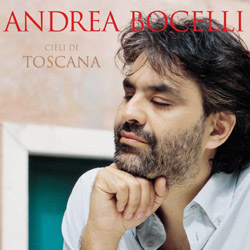
|
| |
- titel:
|
- Cieli di Toscana
|
- year:
|
- 2001
|
- record company:
|
- Sugar /Polydor/ Universal
|
- order numbers
|
- 589 244-2
- or
- UK version: 589 245-2
- (Bonustrack:
Tornerà la neve and CDrom)
- or
- Spanish: 589 223-2, 589285-2
- (4 songs in
Spanish: Un dulce Melodramma, Mil lunas, mil
olas, El mistero del amor, El Encuentro)
-
- or
- Italian: 300 368-2
- (Someone like you in English, L'incontro:
poem in Italian language recited by Andrea)
-
- or
- French: 589 247-2
- (L'incontro:
poem in French recited by Richard Depardieu)
|
-
|
|
|
|
tracklist
(UNIVERSAL)
- and
at www.andreabocelli.com
(incl. lyrics and video)
|
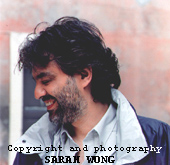 |
- more information about
- the composers
of Melodramma and Mascagni and about the Premio
Bocelli
|
|
- Scuola Grande di San Rocco
in Venice
- October 4, 2001
- presentation
of
-
-
|
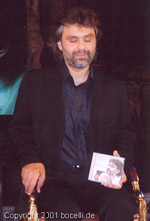 |
|
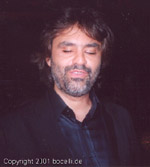 |
- right
site: Andrea with long-standing fans: Astrid Eywo,
Renate Bausch, Alberto Bellucci
|
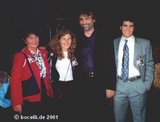 |
|
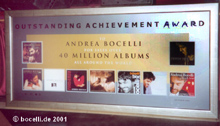
- Outstanding
achievement award for more than 40 million albums
sold worldwide,
- given
October 4th, 2001 in Venice
|
|
|
|
- October 5, 2001
-
- VOICES OF THE PRESS
-
- after the presentation of Cieli di Toscana
- in Venice
|
- Il Tirreno: Bocelli in form
"canzone"
-
(complete article in English translation)
-
-
-
- Corriere della sera: "I use pop to introduce
opera."
- (complete article in English and French translations)
-
-
- Avvenire Online
- (...)
- It's a resonant postcard of Italy and of the musical essence of
Italy, as seen and heard by foreigners. (...). This is one of those
rare CDs that's destined for adults.
- (...)
-
- Brescia oggi
- (...)
- At first listening the artist seems to have succeeded this time in
touching the right chords - to hit the bull's eye - to elicit the most
intimate emotions of his listeners. Melodies, full of orchestration,
and technical perfection compete to try to make the final product
almost impeccable. However, it's the vibrant humanity of the artist
that brings strength to his very popular and beloved vocal style, in
songs that benefit from the usual intimate accents and reflexive walks.
But there's still room for sudden shakeups. In particular, that's the
case of "L'angelo e il diavolo," one of the first songs
written by him at the end of the 80s, that causes an unexpected
interruption, a danceable rhythm in the otherwise calm proceedings.
- (...)
-
- Il Messaggero
- (...)
- ...but the songs are certainly destined to please. A lot. Thanks to
the strength and the classic components of the words, the great vocal
extension, the simple bravura, the profound humanity, the "Tuscan-ness"
of Bocelli, a serious man, simple, a father, a happy husband. Divo.
Against his will
-
- La Nuova Sardegna
- (...)
- It's called "Cieli di Toscana," an homage to the beloved
land of his origin, and the source of new inspirations, the new CD
that signals Andrea Bocelli's return to the pop genre. In the
expectation of its worldwide release on October 15th, Sugar
chose Venice for the presentation to the international press. A
priceless frame for the album with which Bocelli (...) returns to
encounter pop again. More exactly, with his "non-classical music."
An encounter that also represents "a moment to relax, vocally and
psychologically," says the Tuscan singer himself, after the last
two years of classical music engagements, either recording or in the
theater. And on the occasion, Bocelli also emphasizes, to return to an
audience that has followed him through pop but not yet on the
classical side.
- (...)
-
- La Nuova (Venezia)
- Venice discovers itself in love with Bocelli
- He speaks of melancholy and love, of solitude and joy. Perhaps this
is the simple reason for the planetary success that has conquered 40
millon albums sold worldwide, and above all of the passion that
surrounds him. In Venice, in the Scuola Grande di San Rocco, Andrea
Bocelli has assembled his record company, musicians, and friends, to
present his latest CD, "Cieli di Toscana."
- (...)
- Perhaps it's the poetry that's missing, or the serenity, in the dark
days. So the romance, the ballads, return to comfort and soothe the
listener. And there's plenty of it when Andrea Bocelli sings.
- (...)
-
- La Stampa
- (...)
- However, for Andrea Bocelli a pop album is always a little bit like
medicine to take so that he can then dedicate himself in peace to the
great love of his life. (...) The sumptuous album, constructed with
great passion and technique but inevitably approved, satisfies his
true audience, who look for romantic songs on which to dream, filled
however by a powerful and velvety voice; and who appreciate the
workings of opera but who gratefully welcome that there isn't the
heavy weight of tradition and who love the freshness of modern ways
and current sounds.
-
- The Voice of Andrea: Quotes from the press
- October 5, 2001
-
- Il Nuovo
- "The composers have basically understood the characteristics of
my voice. We spent a lot of time together to select the songs. It was
a beautiful challenge. 'Melodramma' could be the story of my life,
because it presents a melodic line that's typically Italian.
'Mascagni' is a beautiful song dedicated to the Tuscan composer Pietro
Mascagni, with the theme of Cavalleria Rusticana within it. 'L'incontro'
is a profound celebration of the relationship between a father and his
son: the words are based on a poem that I wrote when my son Amos was
born. In the version for abroad, the poetry is recited in English by
Bono and in French by Gerard Depardieu."
- "It's very difficult for a song to withstand time. I hope that
the songs of 'Cieli di Toscana' really succeed in this, to survive
with time."
- "I have a vast audience that has followed the course of my
experiments, from 'Romanza' to 'Sogno.' This audience, however, hasn't
followed my during my exploration of classic repertoire. Because I
really owe a lot to them, I decided to record 'Cieli di Toscana.'"
-
- Il Mattino
- "I study and I love grand opera. I have in preparation a CD of
'ancient arias' with Lorin Maazel, and a Trovatore (...). But
I'm also thinking about a CD dedicated to classic American songs,
maybe translated into Italian." ("because my English isn't
perfect." La Stampa)
-
- La Nuova (Venezia)
- "When you use your voice like an instrument, there's always a
double aspect, one from a technical side, the other emotional. However
there's no difference if the whole is what we call art and that the
Greeks defined with the word 'techne,' something that wasn't technique,
but art. The distinction between classical and pop music becomes
radical, because with the first you have to travel with precise and
established laws, while with the second, you can let yourself go and
forget the rules. It's not easier, it's really different. The
difficulty is to find beautiful songs and therefore find composers
that still have emotions to transmit."
- (About "Melodramma") "A song that unintentionally
touches on autobiographical themes. The story of someone who was born
in open spaces and then goes away, uprooted, and despite fortune and
success finds within himself a homesickness for those who are far away,
and he suffers inside."
-
- La Repubblica
- "The songs for me are only about love, not politics or social
issues. And loves end, so they're sad. Of course, that's not to say
that when a love ends it leaves you sad: at times it's a liberation."
- Does it make a big difference to sing conducted by Gergiev or Mehta,
or to be accompanied by a pop band?
- "There aren't terms of comparison. Opera follows iron rules,
pop music allows more liberty. But this doesn't mean that it's easier
to sing."
-
- When asked about the recent tragic events:
- Il Mattino
- "It seems insane to me to continue to present a CD, but I know
that I have to do it. What's happening is atrocious - I don't know
what else to say. I'm only a singer, my throat is an instrument to
make music: Celine Dion says that if God had a voice, he would have a
voice like mine. I thank her, but I hope that at this moment God has
other things to do. I've been at the Twin Towers many times, I've
often traveled on the Boston-New York line, maybe actually on that
cursed airplane. I'm with Giuliani: we have to start working again, to
fly. Soon I'll return to America to introduce my new album. If the
flow of life returns, the terrorists will be defeated before any
military operation."
- "I want to clear it up immediately. There's a piece, very
beautiful, "Se la gente usasse un cuore," that someone could
connect with the American tragedy. Nothing could be further from the
truth: using the heart would have resolved the problems of any
historical era and I don't speculate on misfortune."
-
- Il Messaggero
- "I can't hide, like everyone else, my dismay and profound grief.
I agree, however with the words of the mayor of New York, Giuliani: 'Terrorism
must not intimidate the world, we must fight it and return to normal
life, rebuild even more beautiful towers, higher than before." I
will return to flying, to bring my music to the world. And that is my
assignment."
-
- La Stampa
- Bocelli, you're an artist of two world, very famous in the United
States: how you feel about releasing a CD in such a tragic moment?
- These events are so serious that it isn't up to me to speak about
them, I'm just a singer. I can only express all my fear, my
desperation. I was at the Twin Towers many times, I would have maybe
traveled on one of the airplanes used as a projectile. Believe me,
I've spent 10 sleepless nights. However, then the words of Giuliani
struck me in a positive way: terrorism mustn't find us unprepared, we
mustn't be panic-stricken, we must continue to travel and to live as
we've always done. And I'm about to leave for America, and I'll return
there in November, for concerts and promotions.
-
- There's a touching song in the album, "Se la gente usasse il
cuore," whose words echo many of today's discussions.
- That song was written in former times for the soundtrack of "Cuore"
by De Amicis that you can see on Channel 5. It says very useful
things, and also cites a piece by Vangelo: but I don't want to profit
from a song, I'm very upset about those who speculated on the market
over the tragedy, just imagine if I'd do it.
-
- compilation and translation: M. Morgan
|
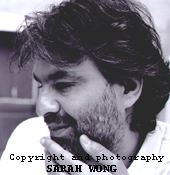
|
- traduction
française of:
- MESSAGERO VENETO - 5 octobre 2001
Un moment de relax aussi bien vocal que psychologique dédié à
sa terre toujours aimée
Bocelli revient au genre pop
Sortie mondiale le 15 octobre du dernier disque "Cieli di
Toscana"
par Luciana Borsatti
Venise - Il s'appelle Cieux de Toscane en hommage à une terre
d'origine toujours aimée et source de nouvelles inspirations, le
nouveau disque qui marque le retour d'Andrea Bocelli au genre pop.
A proximité de la sortie mondiale du 15 octobre, Sugar a choisi
Venise pour la présentation de l'album à la presse
internationale, d'abord à l'Excelsior du Lido et ensuite, dans
l'après-midi, à la Scuola Grande di San Rocco avec la
participation de Bocelli lui-même. Un cadre précieux et
suggestif, donc, pour l'album avec lequel Bocelli (après Romanza
en 1996 et Sogno en 1999) revient se confronter à la musique pop.
Plus précisément avec sa musique non classique. Une
confrontation qui représente aussi "un moment de relax aussi
bien vocal que psychologique" - comme le définit lui-même
le chanteur toscan, après les deux dernières années
d'engagements aussi bien discographiques qu'au théâtre avec la
musique classique (de la Bohème à Verdi, de Tosca à Aïda) et
avec un monde qu'il juge "très sélectif, très dur, très
âpre".
"C'est une occasion - souligne encore Bocelli - pour revenir
à un public qui l'a suivi à travers le pop mais pas encore sur
le versant classique, aussi parce que le pop, dit-il, "est un
jeu à travers lequel on peut communiquer des émotions fortes à
un très grand public, et ensuite se lie à la contemporanéité".
A la première écoute l'artiste semble avoir réussi cette fois
aussi à toucher les cordes sensibles pour faire
mouche,c'est-à-dire pour solliciter les émotions les plus
intimes des auditeurs. Mélodies, amples volutes des
orchestrations, mais aussi des perfectionnismes techniques dans
les tramages digitaux concourent ainsi à la confection d'un
produit qui tend à être impeccable, mais où c'est quand même
la vibrante humanité de l'artiste qui imprime la force à sa
vocalité si populaire et aimée, dans des morceaux qui
privilégient les habituels accents intimes et les allures
réfléchies, mais ne manquent pas cependant d'accélérations et
de secousses inattendues. C'est le cas, en particulier, de 'l'angelo
e il diavolo', une des premières chansons écrites par lui à la
fin des années quatre-vingts, qui fait arriver de façon
inopinée un rythme dansant dans le calme développement de
l'ensemble. Mais c'est aussi le cas de l'apparition surprenante
d'une nouvelle et jeune voix, celle d'une jeune de dix-huit ans
Helena Helling qui est aux côtés de Bocelli dans 'l'abitudine'
de Pierpaolo Guerrini et Giorgio Calabrese. Mais l'album rassemble
dans son ensemble une multiplicité de langages, de l'ouverture
que la production définit comme hollywoodienne de 'Melodramma' à
beaucoup d'hommages à la tradition italienne, de l'hommage à
Pietro Mascagni du morceau homonyme qui commence par les notes de
'Cavalleria Rusticana' aux tons enchanteurs et rêvants de 'Mille
lune mille onde' et de 'Chiara' du franchissement de frontières
de la tradition anglo-américaine de 'Someone like you' aux
nostalgies mordantes et mélancoliques de 'Amori perduti e
paesaggi lontani'.
Mais il y a aussi d'autres surprises parmi les Cieli di Toscana,
comme la présence de Tony Renis en qualité d'auteur de 'Si la
gente usasse il cuore' indicatif de la prochaine fiction de Canale
5 tirée de 'Coeur' par De Amicis que Renis lui-même présente
comme un message plus actuel que jamais parmi le souffle de guerre
de ces jours-ci. Et il y a la double version, en italien et en
anglais, de la poésie de Bocelli qui introduit l'Incontro : un
touchant éloge de la paternité en mémoire de son père disparu,
confié à la voix d'Andrea lui-même et Bono, mais aussi dans la
version française de Gérard Depardieu.
Traduction F. Senger
|
|
|
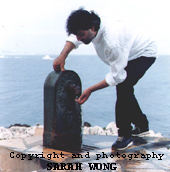
|
|
|
- Andrea
Bocelli has just finished recording a new CD, with a focus on
popular repertoire and the lush touch we've come to expect from the
superstar tenor. Cieli
di Toscana,
due in stores on October 16, 2001 is his first "pop" album
since Sogno.
Cieli di Toscana is a poet's album, Bocelli's own love song
to the sun-and-music drenched romance of Tuscany, and it's a project
that comes directly from the singer's heart, on which he has brought
to bear his considerable forces - as a lover of music, a son of
Italy and a father of sons.
For the new CD, Bocelli chose songs with equal attention to
storytelling and sound. "The language of a pop song should be
genuine...I wanted to work with writers who are inspired, first and
foremost. " The project has been rewarding and exciting for him:
"We were fortunate to find writers who have really sought to
grasp my vocal characteristics, to understand me as a singer. We
spent a lot of time considering many beautiful songs...we have so
many great songs."
"Melodramma," the opening track, could be "the story
of my life," according to Bocelli. The song concerns a man who
leaves his homeland. "Even though life has smiled on him,"
the tenor says, "what he sees in his memories is what is most
dear to him. And it possesses one of the most typically Italian
melodies you could find. It radiates sunshine."
"L'Incontro," written with Francesco Sartori, "is a
celebration of the relationship that binds a father to a newborn
child." Sartori created the music around a sonnet the tenor
wrote on the birth of his first son. The original poem forms a
spoken introduction to the song, and is given a warm and intimate
reading by U2's Bono on the US version of Cieli di Toscana,
by Gérard Depardieu on the French release, and by Bocelli himself
in the Italian release.
Bocelli cherishes the opportunity to champion the art of music and
support the work of other artists. In fact, two of the songs on the
new CD came out of an international songwriting competition, the
"Premio Andrea Bocelli" - the winning composition, "E
Mi Manchi Tu," by Czech composer Zdenek Bartak, and the
impressive runner-up, Italian composer Matteo Musumeci's "Resta
Qui." On another piece, "L'abitudine," Bocelli
introduces Helena - a rising young Italian star whom he discovered -
to his international audience.
On working with Bocelli, producer Mauro Malavasi commented, "What
I like best about working with Andrea is his sense of humor. We
laugh a lot, we talk a lot...the truth is, we often argue and debate
a lot, probably because we share the view that music has to be a
living force."
|
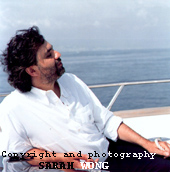
|
- MELODRAMMA
This is the love song of a man deeply rooted to his native land
and family, and who loves a woman still ever present in his memories.
His feelings and his pain are so strong that a melodrama grows in
his heart, a reminder that amid the fields, amid the smell of must
and the countryside, his destiny was born. The life and landscapes
of his childhood haunts come back to mind. The morning is clear. His
nostalgia becomes a song dedicated to all that lost world. Now
through every stage of life, his melodrama is by his side.
MILLE LUNE MILLE ONDE (A THOUSAND MOONS A THOUSAND WAVES)
Re-awakening and the power of love are the main themes of this
song. The two lovers are side by side in the morning. The night just
past here becomes a metaphor for all the highs and lows and problems
they are living through. The song develops into an invitation to
find the strength to fully live the other, forgetting the past and
looking to the future, discovering and nurturing their love.
E SARA' A SETTEMBRE (AND IT WILL BE SEPTEMBER)
At times it's the wind to push us towards our loved one, the wind
as a destiny that convinces us to look again for the one we left.
Perhaps a journey took us far away, but now here we are turning
back, retracing the same steps, the journey back following the voice
of the wind who shows the way. September is that special month. It
takes us behind the still fresh memories of summer. The first sign
of autumn are on the way. It's a bittersweet month, intense yet
fading colors. In September our him and her meet up again, but this
will be forever.
SOMEONE LIKE YOU
The feeling of love is like a wind that lightly blows and comes
and goes continually. A breeze that whispers words in the ear, words
we can't hear when immersed in the day's confusion. They seem too
simple, too elementary. But they are the suns that will let falling
in love continue forever. They are the words that break down
barriers between bodies and they make us be thankful every day to
have found that someone else on our road, exactly the right person
for us.
CHIARA
The song is set in a garden and tells of a man struck by the
serene air of a woman sitting on a bench, reading a book. After a
while, he approaches and they begin to talk.
MASCAGNI
With this song the writers have wanted to pay homage to Pietro
Mascagni, the great composer from Livorno. Key moments in the
maestro's life are celebrated and the main features of his
personality outlined. In particular the writers wanted to underline
how his ethnic roots, the difficulties or his tormented career and
finally his intense love life all strongly influenced his music and
creative process. The writers have noted, in the energy that leaps
out of his music and in the surge of his immortal melodies, the
crucial influence of the places where Mascagni took his first steps.
That is, his native city, which with its sea and typical weather
offered him: a lively cultural life, spontaneity, the tendency to
live life to the full, and meet every new love with passion.
RESTA QUI (STAY HERE)
Something's broken. One of the two went too far. He was too sure
of himself, he didn't care about anything, too confident in the
eternal devotion of the other. Their pact is broken, and trust has
to be earned again. With all the tenderness and promises of joy and
freedom of the early days, with words and gestures that can open a
closed heart. Because he has feared unhappiness.
IL MISTERO DELL'AMORE (THE MYSTERY OF LOVE)
This is a song of a man in search of lost love, the way fraught
with difficulty and intense emotion. There are oceans to cross, the
horizons know no bounds. A journey deep into the soul to discover
love, the true aim of our life.
SE LA GENTE USSASE IL CUORE (IF PEOPLE USED THEIR HEART)
All that is needed is for everyone, all over the world, to use the
feelings that come from the heart so that they can know happiness.
Indifference would be won over. And only you, my heart, you that are
living these emotions, have to be the first to give up your selfish
ways because everything that you will give, you will find. You won't
regret it because you will have the joy of seeing the suffering
around you get less. It won't take much for you to be like a king of
generosity and feelings. And it will be only you to win my heart.
SI VOLTO' (SHE TURNED AROUND)
This is the story of a man involved with a much younger girl. But
he realizes the age gap is too much and it cannot last. He pretends
the affair is of little importance. He bids her farewell but feels
he was deeply in love with her.
L'ABITUDINE (THE HABIT)
Loneliness in time becomes a habit, not a choice you've made. But
suddenly something happens, and you just can't be alone any more.
L'INCONTRO (THE MEETING)
The whole song is a description of the very first moments a father
encounters his child. The idea came from a poem written by Bocelli
himself on the birth of his son.
E MI MANCHI TU (I MISS YOU)
Here there is too much silence, too much tranquility. I tell
myself lies about you coming back, which will never happen. And day
after day, there remains inside me your happiness, your smile as you
left, and a useless hoping against hope. And I miss you.
IL DIAVOLO E L'ANGELO (THE DEVIL AND THE ANGEL)
The clash between body and soul is a timeless theme. We have both.
We have inside us the hunter's predatory instinct as well as that of
the prey, the sensual desire and the absence of any desire, the calm
of peace and the fire of war. We change according to the moment (and
sometimes in the same moment) into angels and devils, we become
unrecognizable to the other as we do to ourselves. To deny this is
pointless.
L'ULTIMO RE (THE LAST KING)
The Last King deals with unconditional love offered to your
beloved total love, expressed in very few, but simple and universal
words: "I want to be at your side to give you all the wonderful
things I have. I want to be at your side to dare the impossible and
make you happy. Your happiness will make of me the last of the kings."
TORNERA' LA NEVE (IT WILL SNOW AGAIN)
The snow is a metaphor for the Spirit. This is sung by a man
embittered by the loss of an important love. But he has faith and
believes that the Spirit will come and make all new and connect with
the same inside us.
|

|
|

